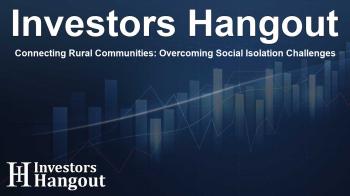Connecting Rural Communities: Overcoming Social Isolation Challenges

Connected Communities: Reducing Isolation in Rural Areas
Strengthening social connections is vital in today’s world, particularly in rural areas where isolation is becoming more pronounced. This challenge has been recognized as a serious concern impacting mental health and community cohesion.
The Issue of Social Isolation
In many regions, there has been a worrying trend toward increased isolation. Reports indicate that over the years, individuals are dedicating more time to solitude, engaging less in person. This is especially troubling among diverse populations in rural America, where personal engagement is crucial for mental well-being.
Concerns Raised by Experts
“It’s critical to address mental health issues in rural communities,” notes Jeff Winton, a dairy farmer dedicated to fostering better mental health practices through his organization, Rural Minds. Mental health challenges are often compounded by prevailing attitudes, including a cultural emphasis on self-reliance and a lack of accessible mental health services.
Shifting Interaction Patterns
Social patterns have evolved, with an increase in remote activities. Research highlights that people are now more likely to conduct meetings, shop, and even socialize from the comfort of their homes. This shift can lead to a diminished sense of community and belonging.
The Role of Human Connection
True human connection is essential and can impact health as significantly as food and shelter. The U.S. Surgeon General's advisory emphasizes that a supportive community aids in both mental and physical health maintenance.
Understanding the Nature of Social Isolation
The terms 'social isolation' and 'loneliness' are frequently used interchangeably, yet they signify different experiences. Social isolation describes a lack of contacts or relationships, whereas loneliness pertains to feelings of disconnection even amidst relationships.
The Crisis in Rural America
Studies reveal that individuals in rural locations experience heightened levels of depression and are less likely to seek mental health care compared to their urban counterparts. The disparity in access can be severe, with rural areas having fewer mental health professionals and resources available.
Health Implications of Social Isolation
The impacts of loneliness extend beyond emotional discomfort and can significantly threaten overall health. Research indicates that isolation can lead to increased risks of premature mortality, heart disease, and strokes. Moreover, insufficient social ties may lead to heightened vulnerability to mental health issues such as anxiety and depression.
Practical Steps to Foster Connections
To combat social isolation and nurture stronger relationships, individuals can pursue proactive measures in daily life:
- Invest Time in Relationships: Regular engagement with friends and family is key to maintaining strong connections.
- Limit Distractions: Prioritize undistracted conversations to enhance the quality of social interactions.
- Volunteer: Look for opportunities to support community service efforts to foster a sense of belonging.
- Practice Gratitude: Being responsive and showing appreciation can reinforce social bonds.
- Join Community Groups: Engaging in local organizations can establish a feeling of purpose and connection.
- Reach Out for Help: Don’t hesitate to contact someone if feelings of isolation arise. Support systems are essential.
Frequently Asked Questions
What is social isolation?
Social isolation refers to a lack of social connections and relationships with others, often leading to feelings of loneliness.
Why is social connection important?
Social connection is crucial for both mental and physical health, serving as a fundamental aspect of a person’s well-being.
How can I reduce my feelings of isolation?
Engaging with friends or community groups, volunteering, and practicing gratitude are effective ways to combat feelings of loneliness.
What are the health implications of social isolation?
Health risks associated with social isolation include increased chances of premature death, heart disease, and mental health conditions.
How does rural living affect social connections?
Rural areas often face greater challenges related to mental health access and social engagement due to fewer resources and social opportunities.
About The Author
Contact Dominic Sanders privately here. Or send an email with ATTN: Dominic Sanders as the subject to contact@investorshangout.com.
About Investors Hangout
Investors Hangout is a leading online stock forum for financial discussion and learning, offering a wide range of free tools and resources. It draws in traders of all levels, who exchange market knowledge, investigate trading tactics, and keep an eye on industry developments in real time. Featuring financial articles, stock message boards, quotes, charts, company profiles, and live news updates. Through cooperative learning and a wealth of informational resources, it helps users from novices creating their first portfolios to experts honing their techniques. Join Investors Hangout today: https://investorshangout.com/
The content of this article is based on factual, publicly available information and does not represent legal, financial, or investment advice. Investors Hangout does not offer financial advice, and the author is not a licensed financial advisor. Consult a qualified advisor before making any financial or investment decisions based on this article. This article should not be considered advice to purchase, sell, or hold any securities or other investments. If any of the material provided here is inaccurate, please contact us for corrections.

